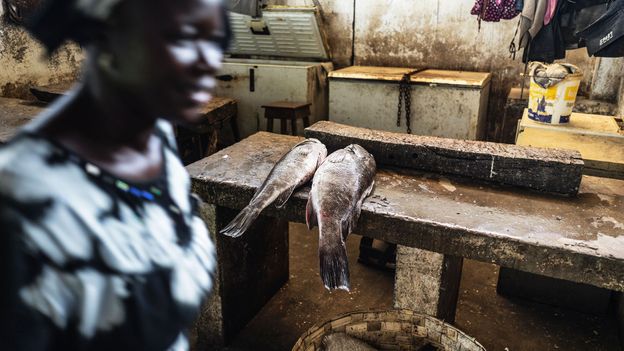
The Covid-19 pandemic has highlighted the tenuousness of this employment landscape, as well as its corruption. In May, many of the migrant workers on fishing crews returned home to celebrate Eid just as borders were closing down. With workers unable to return to The Gambia and new lockdown measures in place, Golden Lead and other plants suspended operation.
Or they were supposed to. Manneh obtained secret recordings in which Bamba Banja, of the Ministry of Fisheries, discussed bribes in exchange for allowing factories to operate during the lockdown. In October, Banja took a leave of absence after a police investigation found that, between 2018 and 2020, he had accepted $10,000 (£7,212) in bribes from Chinese fisherman and companies, including Golden Lead.
On the day that I visited Golden Lead, I made my way down to the sprawling beach. I found Golden Lead’s new wastewater pipe, which was about a foot (30cm) in diameter, already rusted, corroded and only slightly visible above the mounds of sand. A Chinese flag planted earlier was gone. Kneeling down, I felt liquid flowing through it. Within minutes, a Gambian guard appeared and ordered me to leave the area.
The next day I headed to the country’s only international airport, located an hour away from the capital, Banjul, to catch my flight home. My luggage was light now that I’d thrown away the putrid-smelling clothes from my trip to the fishmeal plant. At one point during the drive, as we negotiated pothole after pothole, my taxi driver vented his frustration. “This,” he said, gesturing ahead of us, “is the road the fishmeal plant promised to pave.”
At the airport, I discovered my flight had been delayed by a flock of buzzards and gulls blocking the only runway. Several years earlier, the Gambian government had built a landfill close by, and scavenger birds descended in droves. While I waited among a dozen German and Australian tourists, I called Mustapha Manneh. I reached him at home, in the town of Kartong, seven miles from Gunjur.
Manneh told me he was standing in his front yard, looking out on a litter-strewn highway that connects the JXYG factory, a Chinese fish-meal plant, to The Gambia’s largest port, in Banjul. In the few minutes we had been talking, he said, he had watched 10 tractor-trailer trucks rattle by, kicking up thick clouds of dust as they went, each hauling a 40ft-long (12m) shipping container full of fishmeal. From Banjul, those containers would depart for Asia, Europe, and the United States.
“Every day,” Manneh said, “it’s more.”
--
Join one million Future fans by liking us on Facebook, or follow us on Twitter or Instagram.
If you liked this story, sign up for the weekly bbc.com features newsletter, called “The Essential List”. A handpicked selection of stories from BBC Future, Culture, Worklife, and Travel, delivered to your inbox every Friday.
The Link LonkMarch 24, 2021 at 08:08AM
https://ift.tt/319QKzt
The factories turning West Africa's fish into powder - BBC News
https://ift.tt/35JkYuc
Fish
No comments:
Post a Comment